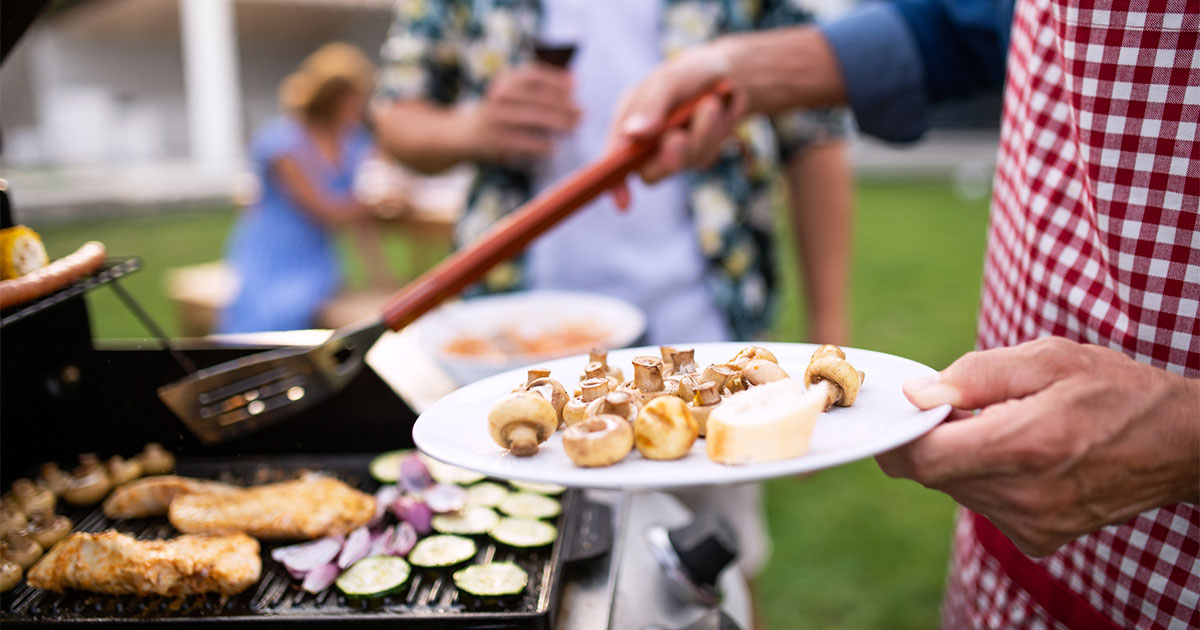
Memorial Day is the unofficial start of summer, and it can’t come too soon. You probably can’t wait for the outdoor gatherings centered around great food and friends, especially after being cooped up for so long during the COVID-19 pandemic. When fun takes priority, as it should in summer—while still following COVID-19 safety measures—you may find yourself less focused on making the nutritious food decisions that are so important during cancer treatment and survivorship.
“The summer weather opens up so many options for us to enjoy, from savory barbecue to refreshing beverages to sweet summer desserts,” says Melissa Picchietti, RD, LDN, Clinical Oncology Dietitian at Cancer Treatment Centers of America® (CTCA), Chicago. “However, many seasonal favorites can have quite a bit of added sugars, fats and calories, which can spoil your efforts to keep a balanced diet.”
But you can still enjoy delicious summer fare and maintain a healthy lifestyle with these five helpful strategies:
Grill foods safely
Cooking meats at high temperatures may produce carcinogens linked to stomach and colon cancer. High-fat meat that drips on the grill when you’re cooking causes smoke, which may deposit carcinogens on the meat. Other cell-damaging compounds may also form when meats are grilled at high temperatures, especially if they’re cooked until well-done or charred.
“That doesn’t mean you have to avoid backyard barbecues,” says Picchietti. Follow these tips for making your grilled meats and poultry tasty and safe:
Cook at a lower temperature. This usually only adds a few minutes to cooking and produces substantially fewer carcinogens.
Make sure grates are clean and oiled to prevent sticking. Residual meat and fat drippings on grates can continue to cook and become carcinogenic.
Choose lean meats (including white instead of dark poultry) and remove skin to avoid flare-ups and smoke.
Use a marinade. Studies have shown that marinating meat 30 minutes before grilling decreases carcinogen formation by up to 96 percent. Add sweet sauces like barbecue during the last few minutes to avoid charring.
Flip meat frequently to decrease carcinogens that may arise.
Set one side of a gas grill to medium-high and the other to low, or build a fire on only one side of a charcoal grill. Point thicker ends of meat toward the hot side to cook more evenly.
Don’t eat charred portions of meat; instead, cut them off.
Partially pre-cook meats before grilling. Steam (two to five minutes) or microwave (60 to 90 seconds), to reduce the meat’s total time cooked at high heat.
Substitute fruits and veggies since they don’t form carcinogens when grilled.
Add more fruits and vegetables to the menu
Summer’s produce selection is abundant, and Picchietti recommends incorporating as many colors of the rainbow you can find when picking fruits and veggies.
“Some patients undergoing cancer treatment or who take certain blood pressure and/or blood thinner medications may need to avoid eating grapefruit, but unless your doctor tells you otherwise, the greater the variety of produce you consume the better!” she says.
A surprising way to enjoy summer-fresh fruits is on the grill, Picchietti notes. “Peaches, pineapple and watermelon taste excellent grilled. Also, making your own fresh salsas, salads, hummus and guacamole enables you to select the flavors you like and helps you get the nutritious benefits of your produce without unnecessary additives,” Picchietti says. “I often recommend the American Institute for Cancer Research’s healthy recipes to my patients.”
Here are more ideas for getting extra fruits and veggies into your diet this summer:
Serve healthy munchies as appetizers. Set out bowls of veggies, including celery, carrots, radishes and broccoli cut up and ready for snacking. Serve with salsa, spinach dip or hummus—remember one-half cup counts as a single serving.
Make a salad or stir fry as your entrée. Use lots of vegetables and just a little protein—meat, poultry, fish, tofu or nuts.
Blend veggies into spreads. Mix finely grated raw carrots with peanut butter or add finely chopped broccoli to cream cheese or ricotta cheese. Use as spreads on crackers, apples or bananas.
Start the day with a protein-packed vegetable omelet or scrambled eggs cooked with cut-up vegetables.
Drink your veggies. An 8 oz. glass of 100 percent vegetable juice has less than half the carbs and calories of regular orange juice.
Creatively substitute ingredients
Many recipes for summertime feature sugar, salt and high-fat ingredients, which you’ll want to avoid if you’re trying to lose weight or you’re on a restricted diet. Using some creativity, you can find ways to improve the nutritional impact of your favorite dishes. Here are a few ideas:
Hold the mayo. Try some a new taste-twist on traditional potato or pasta salad. For a creamy dressing, combine Greek yogurt, apple cider vinegar, Dijon mustard, garlic, salt and pepper.
Swap the sauce. Instead of barbecue sauce, which is notoriously high in sugar, experiment by topping your favorite cooked protein with a tomato salsa made with fresh cilantro and garlic or an avocado mango salsa. Also, a dry rub made of herbs and spices is great way to add flavor without fat.
Use salt substitutes. Try naturally low-salt spices in your recipes, like basil, rosemary, garlic powder and onion powder. Blend them together with olive oil and lemon juice to make a pre-grilling marinade for meats, fish or poultry
Cut the sugar. You can reduce sugar in recipes by about 25 percent without noticeable differences, including baked items, according to Eat Right, a website hosted by the Academy of Nutrition and Dietetics. When reducing sugar, you may need to increase the liquid in a recipe.
Increase your water intake
It’s important to stay hydrated all year-round, but when it’s warm outside, your body loses more fluid through perspiration, so you need to drink more to avoid becoming dehydrated. “Think of your body as a vase filled with water,” says Picchietti. “It’s crucial to maintain your body’s fluid balance in order for it to function properly.”
For cancer patients, staying hydrated during treatment is essential, since even mild dehydration may disrupt your cancer treatment plan, and some drugs can only be given safely if your body is adequately hydrated.
So how much water do you need? A good goal is to drink at least 64 ounces a day, or about eight cups. During summer heat or when exercising, Picchietti suggests adding electrolyte beverages to replenish the electrolytes you lose through sweating.
Electrolytes are minerals that are critical in maintaining key body functions. While many sports drinks are supplemented with electrolytes, you’ll want to avoid brands with sugar and other additives. You may want to try a bottled electrolyte-enhanced water, or one of the newer electrolyte-infused workout-recovery options, which come as fizzy tablets to drop in your water.
Watch your alcohol consumption
Summer get-togethers often involve cold, alcoholic beverages—beer, margaritas and sangrias, for starters. Though these beverages may taste delicious, consuming alcohol comes with added calories and other risks.
“All alcoholic beverages are dehydrating,” says Picchietti. “But you can neutralize the dehydrating effect of alcohol by pairing it with a non-caffeinated mixer and by consuming as much water as the alcohol you drink.”
Also, remember that risks increase with the amount of alcohol you drink. Alcohol consumption is linked to developing certain kinds of cancer, including head and neck, esophageal, liver, breast and colorectal cancers.
The 2020-2025 Dietary Guidelines for Americans says that “adults of legal drinking age can choose not to drink, or to drink in moderation by limiting intake to 2 drinks or less in a day for men or 1 drink or less in a day for women, on days when alcohol is consumed.”
However, many experts recommend that, if you’re in cancer treatment or trying to lower your cancer risk, abstain from alcohol altogether, and Picchietti agrees. “With so many non-alcoholic options to choose from—refreshing ice teas, lemonades, shakes and smoothies—cancer patients and those concerned about their cancer risk can still enjoy fun, refreshing beverages.”


